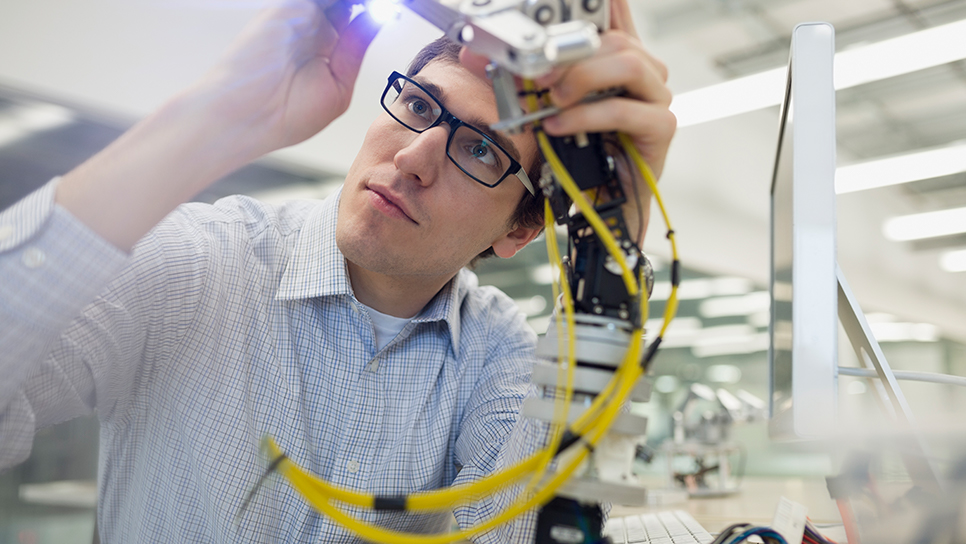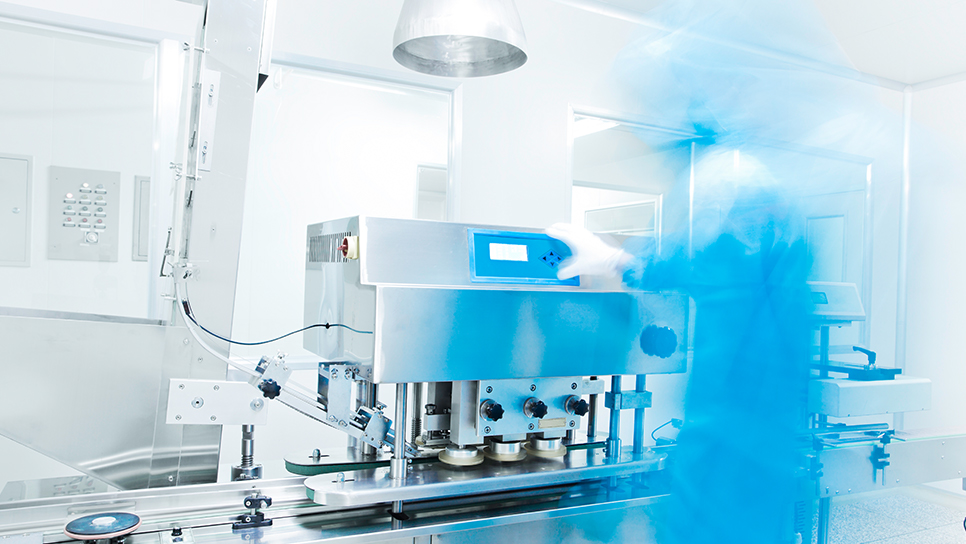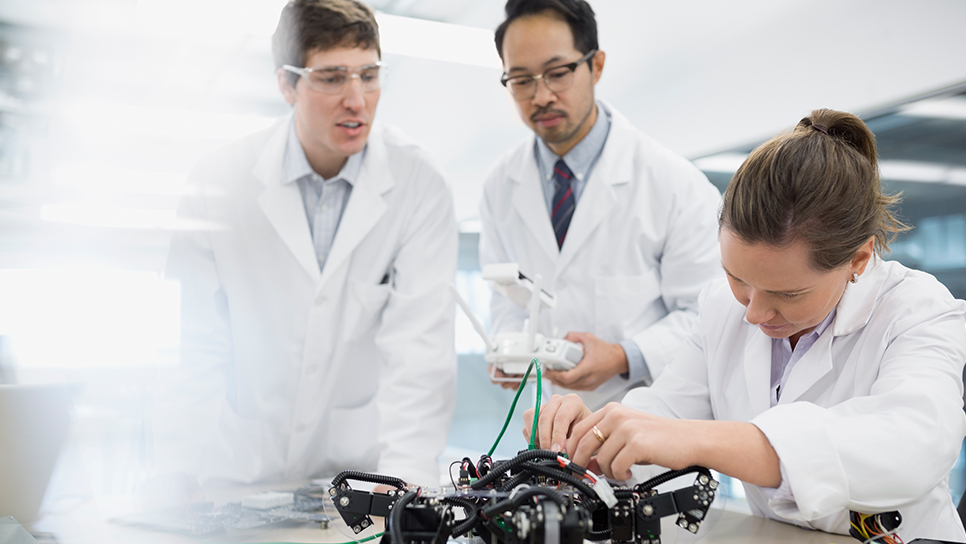IN PARTNERSHIP WITH


IN PARTNERSHIP WITH

The city-state’s R&D and innovation skillset is attracting the world’s top technology and biomed companies.
Artificial intelligence (AI) startup DataRobot has its eye on the future—and it sees the future of innovation taking shape in Singapore.
The Boston–based technology company applies its cutting-edge AI tech across several industries, from insurance and airlines to financial technology. In November 2017, the firm announced that it would create a S$15 million research and development (R&D) center in Singapore in order to build out DataRobot’s AI capabilities. The center will employ 50 data scientists and technicians by 2019, and the team will work on building and improving its automated machine learning platform that can create predictive models according to their customers’ needs.
DataRobot CEO and Co-Founder Jeremy Achin explained the strategic move to The Straits Times (Singapore): “The future is in AI and we believe Singapore can be the center of this brave new world.”
Business leaders like Achin who are eager to ride the wave of R&D innovation, be it in emerging fields like AI or cybersecurity, are increasingly looking to Singapore. According to the Global Innovation Index, the country was ranked No. 1 in Asia and No. 7 globally among the world’s most innovative countries in 2017.
Chief among the technologies driving Singapore’s R&D renaissance is AI, bolstered by government-led initiatives like AI Singapore, a S$150-million program spearheaded by the National Research Foundation (NRF) Singapore.
The initiative seeks to address key challenges in the country, from healthcare services to traffic congestion, with AI-powered solutions—but global firms also stand to benefit. In recent months, AI Singapore has announced partnerships with Intel Corporation and PwC Singapore.
But it’s not only multinational heavyweights like Intel and PwC that are investing in AI. Businesses worldwide increasingly agree that AI is the future—and R&D initiatives like AI Singapore are helping to ensure that global companies will build that future in Singapore.
“To keep pace with digital disruption, Singapore recognizes the need to take an innovation-led approach to develop and grow our digital economy,” says Mr. Ang Chin Tah, Director of Infocomms and Media at the Singapore Economic Development Board (EDB).
With initiatives like AI Singapore, we are convening an ecosystem of public and private players to nurture talent, as well as to create and deploy AI in key areas such as advanced manufacturing, healthcare, finance, and smart cities.

Inclusive of and beyond AI, robust research-fostering government programs like the NRF’s Research, Innovation and Enterprise (RIE) 2020 Plan are also proving to be major factors in Singapore’s ascendance. Launched in 2016, RIE supports research in four key sectors: advanced manufacturing and engineering, health and biomedical sciences, urban solutions and sustainability, and the services and digital economy.
With its RIE2020 Plan, Singapore’s government is doling out S$19 billion for research projects by 2020, and a significant portion of those funds are devoted to public-private collaborations. Among the global companies participating in RIE2020 research efforts are Proctor & Gamble, Novartis, GlaxoSmithKline, and General Electric.
RIE2020 is just one of many national initiatives that make Singapore a thriving R&D hub for AI and other emerging technologies. To understand why Singapore has become a hotbed of innovation for both global corporate giants and ambitious startups, consider the case studies of two industries where R&D is blossoming in Singapore: technology and biomedical sciences.

An Ideal Ecosystem for Tech R&D
Singapore’s driving of AI growth in Southeast Asia further boasts the city-state’s mature and robust technology industry. According to the Singapore EDB estimates, 80 of the world’s top 100 technology companies have presences in Singapore, and they account for approximately 6.5 percent of the country’s GDP. Credit for the nation’s appeal must go to its state-of-the-art infrastructure, business-friendly tax structure, and stringent intellectual-property laws.
An inviting business climate and a talented workforce are attracting technology companies to Singapore by brewing an ideal environment for R&D, according to David Varvel, director of Pivotal Labs Singapore. Pivotal Labs, a software and services company based in San Francisco, first set up shop in Singapore in 2013 to guide companies such as Ford Motor Company and DBS Bank in their software development efforts throughout Asia.
If you don’t have this ecosystem, you have to build a lot of infrastructure,” Varvel explains. “With the infrastructure available here, you can move at a faster speed at lower cost.

Says Varvel’s colleague Lionel Lim, vice president and managing director for Pivotal Labs in Asia, Pacific, and Japan, “In technology, we think about Silicon Valley as a destination—every IT company has to be there. By the same token, Singapore provides that ecosystem for companies expanding into Asia-Pacific.”
This vibrant business ecosystem is more than just the product of strategic efforts and good luck—it’s a reflection of Singapore’s culture, says Varvel: “The national character is always forward-looking.”
Among the forward-thinking tech companies flocking to Singapore for its R&D are NEC Asia Pacific and the Alibaba Group. NEC Asia Pacific is teaming up with the government’s Safety and Security Industry Programme 2020 to test fingerprint and facial recognition devices for public safety initiatives. And in February 2018, the Chinese tech and e-commerce behemoth Alibaba announced a partnership with Nanyang Technological University, Singapore, to establish a joint research institute for AI technologies. It will be Alibaba’s first research institute outside of China.
In another public-private R&D partnership, SAP has launched an Innovation Center Network in Singapore. At the center, data scientists partner with PhD students from National University of Singapore to develop machine-learning solutions for businesses. Among its latest innovations is a machine learning-driven “service ticket intelligence system” that automates—and, in the process, learns how to better respond to—customer service tickets.
Even Dyson—yes, the tech-savvy household appliance manufacturer—is making a major bet on Singapore’s AI potential with its new R&D Tech Center. Opened in 2017, the center represents a S$587 million investment in the development of new technologies in AI-driven capabilities such as robotics, machine learning, fluid dynamics, and vision systems.

Biomedicine and Healthcare Gets in on the R&D Act

Why are biomedicine and healthcare companies— including those developing potential biomedical applications for AI—conducting so much R&D in Singapore? One clear reason is that so many of them have already established footholds in manufacturing there.
The country hosts more than 50 biomedical sciences facilities for such biopharma leaders as Merck Sharp & Dohme (MSD), Novartis, and Roche. In addition, global medical technology companies—including Becton Dickinson, Medtronic, and Thermo Fisher Scientific—have set up manufacturing plants in Singapore. The significant presence of biomedical facilities means that Singapore is a powerhouse in this industry: The country manufactures four of the top ten drugs by global revenue, according to the Singapore EDB, as well as devices such as implantable pacemakers, contact lenses, and life science instruments.
Some of the credit for Singapore’s strength in biomedical and healthcare goes to A*STAR (Agency for Science, Technology and Research), which advances scientific discovery and technological advances by bringing together the wider research community, private enterprise, and top-notch research facilities—National University of Singapore, Massachusetts Institute for Technology, and Duke University, among others.
In 2017 alone, A*STAR-funded projects led to several developments: self-healing heart cells; a genetic mutation that can prevent glaucoma; and major advances in the development of personalized medicine through the use of patients’ stem cells in the prediction of adverse drug reactions.
But it’s not just A*STAR that has supported biomedical growth. Singapore houses more than 20 R&D centers founded by medical technology companies, as well as more than 200 medical technology startup companies, according to the Singapore EDB.
Beyond pioneering groundbreaking medical treatments and developing new medicines, companies in Singapore are innovating fresh AI-enhanced approaches to patient care. AI Singapore industry partner Raffles Medical Group wants to harness AI and the Internet of Things (IoT) to allow families to care for the elderly at home.

The Secret Sauce: Competition + Collaboration
The influx of R&D money into Singapore may not be the greatest source of its success as a hub for global innovation. Competition is also driving companies to innovate smarter—and faster.
“People who come here from the United States or Europe are surprised at how competitive this market is on a technological level,” says Pivotal Labs’ Varvel. He points to DBS Bank, which, a decade ago, was seen as a traditional financial institution without much of a reputation for embracing digital. With its cloud-based development platform, DBS has removed backend system inefficiencies and is bringing new digital features to market faster.
“Singapore companies are feeling the heat, and need to break into new markets, as well as do a better job in Singapore,” Varvel says. The zeal for competition, Varvel explains, raises the stakes for other businesses in each industry, which, in turn, encourages other businesses to adopt the innovative technologies that are helping their rivals flourish.
But Singapore’s business leaders recognize that cutthroat competition alone can’t spur companies to ever-greater heights of invention and experimentation.
To that end, Singapore’s Data Innovation Programme Office has announced its own experiment: Later this year, it plans to roll out a “Data Sandbox,” which promises to be a neutral forum for companies to securely share data without jeopardizing their own intellectual property or business interests. The Data Sandbox will also provide data analytics tools to help companies build expertise in data science.
This concept to spark innovation through collaboration within and across industries is at once simple and ingenious. The age-old wisdom is as true in Singapore as it is elsewhere: A rising tide lifts all boats.